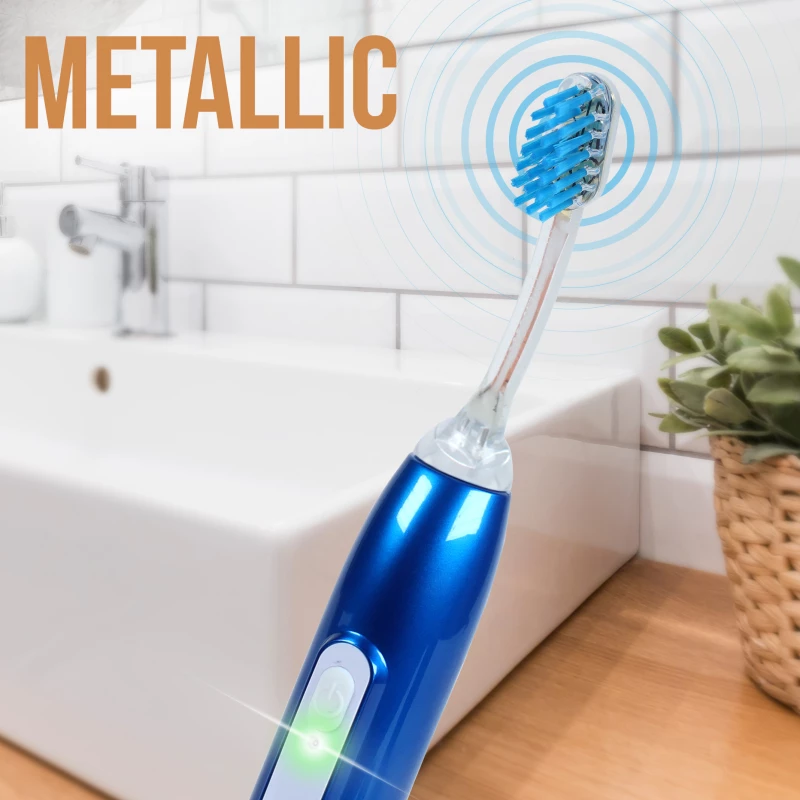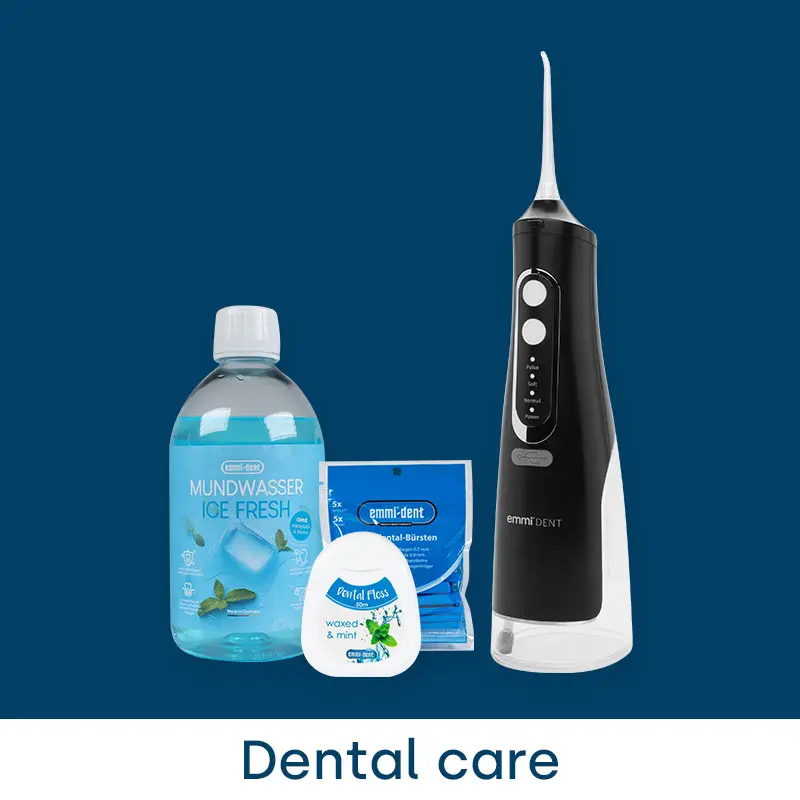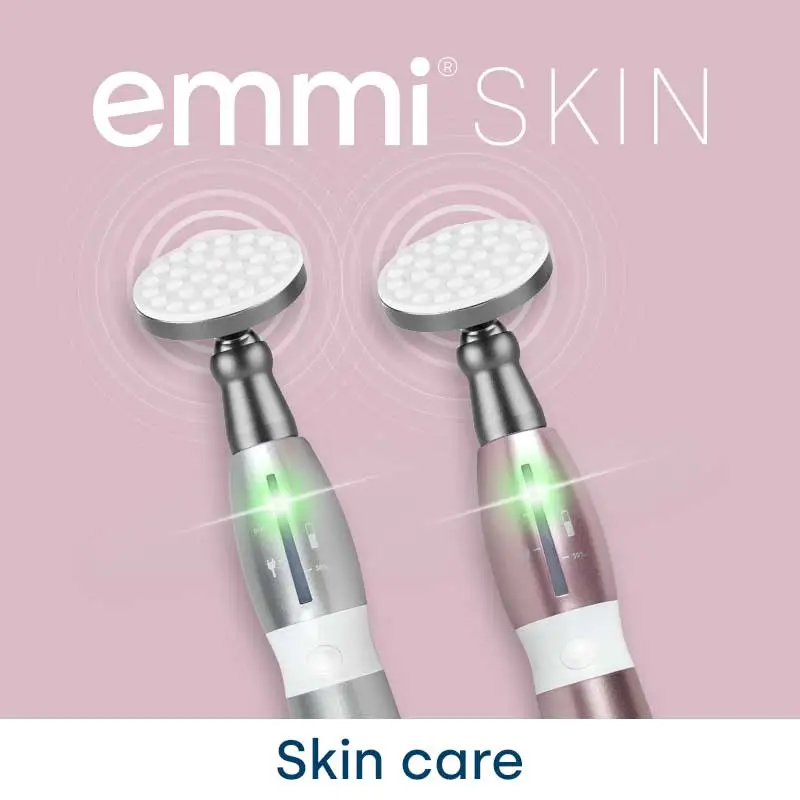
Oral health is an essential part of overall wellbeing, especially for people with diabetes. Diabetes can have a significant impact on oral health, which is why it is important to know and follow appropriate care instructions. This article looks at the links between diabetes and oral health and gives you valuable tips on how to optimise your oral health.
How diabetes affects oral health
Diabetes can affect your oral health in various ways. If you have diabetes, it's especially important to take care of your oral health, as high blood sugar levels weaken your body's defences and increase the risk of infections. Here are the 4 most important factors that can negatively affect your oral health:
1. increased risk of gum disease
High blood sugar levels increase the risk of gingivitis (inflammation of the gums) and periodontitis (severe gum disease). These diseases can lead to tooth loss if they are not treated in time. Gum disease is not only painful, but can also have a serious impact on your general health.
It's important that you recognise the first signs - such as bleeding gums, swelling and redness - and take action immediately. Regular visits to the dentist and good oral hygiene are crucial to getting these problems under control.
2. dry mouth and its effects
Diabetes can lead to reduced saliva production, resulting in dry mouth (xerostomia). Saliva plays an important role in neutralising bacteria in the mouth and protecting the teeth. A dry mouth can increase the risk of tooth decay and infections. Dry mouth can also make eating and speaking uncomfortable and affect your quality of life.
Drink plenty of water and use special mouthwashes to relieve the symptoms of dry mouth and support your oral health.
3. frequent mouth infections
People with diabetes are more susceptible to oral infections such as thrush (a fungal infection). These infections can be painful and further affect oral health. Thrush can cause white, painful patches in the mouth and make eating and speaking difficult.
Good oral hygiene and regular visits to the dentist can help prevent such infections. Use one of our emmi-dent ultrasonic toothbrushes, which clean your teeth thoroughly and gently and help to reduce the risk of infections.
4. delayed healing due to wounds in the mouth
Wounds in the mouth, such as after tooth extractions or other dental procedures, heal more slowly in diabetics, which increases the risk of complications. Delayed healing can lead to infections and other serious problems.
It is important that you take extra care of your oral health after dental procedures and follow all instructions from your dentist. Use the emmi-dent ultrasonic toothbrush to ensure gentle but effective cleaning without compromising healing.
By taking these important factors into account and taking active measures, you can maintain optimal oral health even with diabetes. Watch out for:
- careful oral hygiene,
- regular visits to the dentist and
- a healthy diet,
to maintain your radiant smile and a good feeling in your mouth in the long term.
Important care instructions for diabetics
To maintain your oral health in the long term, you should follow special care instructions as a diabetic. Your dental health is also crucial for your general well-being and can be significantly improved through careful oral hygiene and regular visits to the dentist. Here are 3 important care tips that you should consider:
Tip 1 - regular visits to the dentist
Visit your dentist at least twice a year for a professional dental cleaning and examination. Your dentist can recognise and treat signs of problems early on. Regular visits to the dentist are crucial to keep your oral health under control and avoid serious complications.
The dentist can also give you personalised recommendations on how you can improve your oral hygiene and which signs you should pay particular attention to.
Tip 2 - daily oral hygiene routine
Brush your teeth at least twice a day with a soft toothbrush and fluoride toothpaste. The emmi-dent ultrasonic toothbrush is an excellent choice as it cleans gently and effectively without damaging the enamel. The innovative ultrasonic technology cleans your teeth thoroughly and reaches even hard-to-reach areas. Use floss or interdental brushes to keep the spaces between your teeth clean.
Thorough oral hygiene helps to reduce plaque and bacteria and minimise the risk of gum disease.
Tip 3 - Use the right dental care products
Use special toothpastes and mouthwashes that have been developed for sensitive gums. These products can help prevent gum disease. Your dentist can recommend the best products that are specifically tailored to your needs as a diabetic.
There are many products on the market that have been specially developed for people with diabetes and that can support your oral health.
By following the three most important care tips, you can significantly improve your oral health as a diabetic.
- Regular visits to the dentist,
- Careful oral hygiene and monitoring your blood sugar levels
are key components for a radiant, healthy smile and well-being.
The importance of diet for oral health in diabetes
A balanced diet plays a crucial role in your oral health, especially if you have diabetes. The right diet can help prevent tooth decay and gum disease while improving your overall health. Here are 4 important facts you should definitely consider:
Fact 1 - the low-sugar diet
Reduce your consumption of sugary foods and drinks to prevent tooth decay. Sugar can feed oral bacteria that produce acids and attack tooth enamel. These acids attack tooth enamel and lead to tooth decay. A low-sugar diet helps to reduce your risk of tooth decay and other oral health problems.
Remember that sugar is not only found in obvious sweets, but also in many processed foods. So read the ingredients lists carefully and opt for natural alternatives such as fresh fruit.
Fact 2 - the importance of a balanced diet
Make sure you eat a balanced diet that is rich in vitamins and minerals. Foods such as fruit, vegetables, wholemeal products and proteins contribute to your general health and strengthen your immune system. A healthy diet not only supports your general health, but also your oral health.
Vitamins and minerals such as calcium, vitamin D and vitamin C are particularly important for strong teeth and healthy gums. Calcium helps to strengthen tooth enamel, while vitamin D improves calcium absorption. Vitamin C promotes gum health and helps heal wounds.
Fact 3 - Foods that promote oral health
Certain foods can be particularly beneficial for your oral health. Apples, carrots and celery are great as they are not only nutrient-rich, but also help to reduce plaque and promote saliva production. The saliva in particular plays an important role in protecting your teeth as it helps to wash away food debris and harmful bacteria.
Dairy products such as cheese and yoghurt are also very beneficial as they contain calcium and phosphates, which can strengthen tooth enamel. These foods not only contribute to a healthy diet, but also support good oral hygiene by protecting your teeth and gums.
Fact 4 - Use emmi-dent ultrasonic toothbrush
In addition to a healthy diet, proper dental care is crucial. Our emmi-dent ultrasonic toothbrush can help you take optimum care of your teeth and gums. This toothbrush cleans your teeth thoroughly and gently without damaging the enamel.
Thanks to the ultrasonic technology, it also reaches hard-to-reach areas and helps to effectively reduce plaque and harmful bacteria. Regular use of our emmi-dent ultrasonic toothbrush can also help to keep your teeth healthy and reduce the risk of tooth decay and gum disease.
Signs and symptoms of oral health problems in diabetics
It's extremely important to pay attention to signs and symptoms of oral health problems, especially if you have diabetes. Your mouth can give you many clues about your overall health, and recognising problems early can prevent serious health complications. Below we have listed some important signs and symptoms that you should be aware of:
Symptoms of gum disease
Gum disease can cause serious health problems if it is not treated in time. The most common symptoms include
- Bloody gums: If your gums bleed when brushing or flossing, this can be an early sign of gingivitis (gum inflammation). Don't ignore this symptom, visit a dentist to get an accurate diagnosis.
- Swelling and redness: Swollen and reddened gums are also signs of inflammation. These symptoms indicate that your gums are reacting to bacterial attacks and need immediate attention.
- Gum recession: If your gums begin to recede from your teeth and expose the roots, this is a serious symptom of periodontitis (severe gum disease). This can lead to tooth loss if left untreated. It is important that you see a dentist immediately if you notice these symptoms.
Signs of dry mouth
Dry mouth, also known as xerostomia, can be very uncomfortable and cause various health problems. Look out for the following symptoms:
- Frequent thirst: A constant feeling of thirst can be a sign of dry mouth. Your body is signalling that there is not enough saliva to keep your mouth moist.
- Dry tongue and chapped lips: If your tongue is dry and rough or your lips are chapped, this could indicate insufficient saliva production. Saliva is important for keeping the oral cavity moist and neutralising bacteria.
- Burning sensation in the mouth: A burning sensation on the tongue or in the entire mouth area can be another symptom of dry mouth. This sensation can be very uncomfortable and make eating and speaking difficult. Good oral hygiene and special products such as moisturising mouthwashes can help to alleviate the symptoms and improve oral health.
When a visit to the dentist is necessary
There are certain symptoms that you should consult a dentist about immediately to prevent serious problems:
- Persistent pain: If you have pain in your mouth, teeth or gums that doesn't go away on its own, it's important to have it checked by a dentist. Pain can be a sign of various problems such as tooth decay, infection or gum disease.
- Swelling: Swelling in the mouth area, whether on the gums, cheeks or other areas, should always be taken seriously. Swelling can indicate an infection that requires immediate treatment.
- Bleeding: Bleeding in the mouth that is not caused by injury is a warning sign of gum disease or other health problems. Consult your dentist to find out the cause and take appropriate action.
It is particularly important for diabetics to take these symptoms seriously as they are more susceptible to oral health problems. Early diagnosis and treatment can prevent serious problems. Your dentist can help you maintain your oral health and avoid complications.
Treatment options and prevention for diabetes
There are various treatment options and prevention strategies to maintain and promote oral health in diabetes. It's especially important to take care of your oral health as a diabetic, as high blood sugar levels can increase the risk of gum disease and other oral problems. Here are 3 actions you can take right away:
Measure 1 - professional dental cleanings
Regular professional dental cleanings are one of the best ways to remove plaque and tartar and reduce the risk of gum disease. Your dentist can remove stubborn deposits that you can't reach with your daily dental care. These cleanings should be performed at least twice a year. During these visits, your dentist can also recognise early signs of gum disease and treat them before they cause serious problems. You will also receive valuable tips on how to improve your oral hygiene that are specifically tailored to your needs as a diabetic.
Measure 2 - special mouthwashes and toothpastes
Use mouthwashes and toothpastes that have been specially developed for people with gum disease. These products often contain active ingredients that help to reduce gum inflammation and fight bacteria. Your dentist can recommend suitable products to support your oral health and prevent problems. Make sure to use these products regularly to maximise the benefits. These specialised dental care products are an important part of your daily oral hygiene routine and can make a big difference.
Measure 3 - Home remedies and natural remedies
Home remedies and natural remedies can be a valuable addition to your daily oral hygiene routine. Herbal remedies such as camomile tea can help soothe inflammation and promote oral health. Chamomile has anti-inflammatory and soothing properties that are particularly useful for gum inflammation. Prepare a mouthwash by brewing chamomile tea, letting it cool and rinsing your mouth with it.
A healthy dental diet is also crucial. Avoid sugary and highly processed foods that increase the risk of tooth decay. Instead, focus on
- fresh fruit,
- Vegetables,
- Wholemeal products and
- lean protein,
to strengthen your teeth and gums. These foods provide your body with the necessary nutrients and promote general health.
Good oral hygiene is of course essential. Brush your teeth at least twice a day and use floss or interdental brushes to keep the spaces between your teeth clean. Our emmi-dent ultrasonic toothbrush can help you to clean your teeth thoroughly and gently without damaging the enamel. Its ultrasonic technology also reaches hard-to-reach areas and effectively reduces plaque and bacteria, which is particularly important for preventing gum disease.
By utilising the treatment options and prevention strategies we have outlined, you can significantly improve your oral health as a diabetic and reduce the risk of complications. Regular visits to the dentist, the right choice of dental care products and a healthy lifestyle are the key to a radiant smile and optimal oral health.











